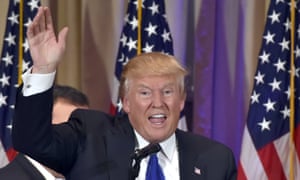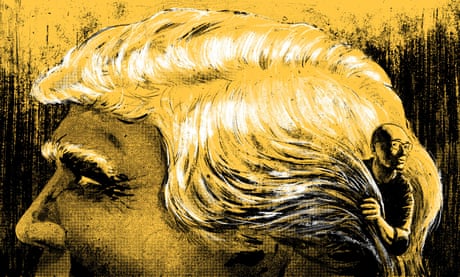The Misfits and Geniuses Racing to Put Space Within Reach
https://www.books.com.tw › prod...
書名:When the Heavens Went on Sale: The Misfits and Geniuses Racing to Put Space Within Reach,原文名稱:太空商業時代:馬斯克引發的太空經濟革命, ...
NT$450.00 · In stock
Lynn Yamada Davis, Whose Cooking TikToks Delighted Millions, Dies at 67
Older than most social media stars, she attracted a large following with her Cooking With Lynja videos, which were both wholesome and zany.
By CLAIRE MOSES
Jan. 11, 2024
At home he was a quirky dad, sometimes fun and even zany, but often stern. “He never hugged us,” Whit Rummel said.
'Winning, winning, winning': the genius of The Donald’s Trumpspeak
Donald Trump’s dazzlingly vague speeches are a far cry from the carefully engineered soundbites of most political rhetoric. So what exactly is he doing?
 ‘We’re going to win so much; you’re going to be so happy’ … Donald Trump. Photograph: UPI / Barcroft Media
‘We’re going to win so much; you’re going to be so happy’ … Donald Trump. Photograph: UPI / Barcroft MediaSteven Poole
Friday 4 March 2016 12.59 GMTLast modified on Saturday 5 March 201600.06 GMT
The rise of Donald Trump has been greeted outside his fanbase with amusement giving way to frank horror. He has morphed from a weird-haired clown into something far more sinister. The bien pensants are aghast, even the people who pass for bien pensants within the Republican party itself. Still, what everyone seems to agree on is that his method of communication is something quite novel in American politics. Trumpspeak does not traffic in wonkish explanations of policy. It appears free of carefully engineered soundbites. The man speaks as though off the cuff, in an edgy mashup of surreal non sequiturs, jokes, and insults. He doesn’t, in short, sound like a politician. So one theory has it that, as the former political speechwriter Barton Swaim has written, Trump is popular precisely because “he never uses magniloquent rhetoric for any reason. He spurns it.”
The key weapon of Trumpspeak is a single two-letter word: 'so'
But there’s no such thing as political speech free from rhetoric. If Trumpspeak does not conform to the usual patterns, the challenge is to identify what exactly he is doing. He is evidently a master of the folksy analogy – on Palestine, he declared: “I am very pro-Israel, but it doesn’t do any good to start demeaning the neighbours” – and the amplifying fizz of repetition: “We weren’t expected to win too much, and now we’re winning, winning, winning the country. And soon the country’s going to start winning, winning, winning.” (Fans of technical rhetoric terms will identify this as an example of epizeuxis.)
Donald Trump was supposed to lose the latest debate. Far from it
Jeb Lund

Read more
But the key weapon of Trumpspeak, I think, is a single two-letter word: “so”. Once you start noticing how often Trump uses the word “so” as a stand alone intensifier, to mean “exceptionally” or “hugely”, you see it everywhere. And this morpheme is what makes his projections of victory so emotionally thrilling. “We’re going to win so much; you’re going to be so happy,” he told supporters in New Hampshire. In another speech in Ohio, he said of his policies, “It’s all morphed into one big beautiful package. The package is called you, but maybe it’s in the form of me. And you’re going to be so proud, and you’re going to be so happy, and you’re going to win again. We’re going to start winning so much.” In South Carolina, the same elements were slightly shuffled yet again: “We’re going to do something you’re going to be so happy with. We’re going to win so much and we’re going to make America great again.”
This actually is magniloquent rhetoric, but it is also dazzlingly vague. Trumpspeak comes close to pure phatic communication: speech with the sole purpose of making the listener feel good, rather than conveying any information. Trump will do “something” to make everyone happy – what exactly? It doesn’t really matter. In Nevada, supporters heard: “We’re going to bring in so much money and so much everything.” How much money? So much what? It’s irrelevant. Just feel the soaring thrill of the “so”, which efficiently bypasses any ideas of how these things might actually be accomplished. The usefulness of “so” in hedging one’s bets was, perhaps inadvertently, acknowledged when Trump told supporters in New Hampshire: “We are going to make America so great again, maybe greater than ever before.” Maybe – or maybe not? The Trumpian “so” also works similarly in the opposite direction: to intensify negatives without descending to grubby detail. On jobs, he said in Florida: “I mean, we are losing so much.” On Hillary Clinton’s emails: “What she has done is so criminal.”

'Not even my wife knows': secret Donald Trump voters speak out
Of course, Trump does have some notorious concrete ideas: the Mexican wall, the ban on Muslim immigration, and so forth. There’s a plausible view, however, that these extreme positions are not so much sincere commitments as zany weather balloons, floated to see how well they play with the public, as well as to bamboozle his Republican opponents. Jimmy Carter prefers Trump to his closest rival Ted Cruz, precisely on the basis that he thinks Trump is “malleable”, without any “fixed” positions. If so, the difference between Trump and his rivals is simply that he is conducting his focus groups in public.
“I’m so honored by this evening,” Trump told supporters in Florida after winning seven states on Super Tuesday. The continuing genius of the Trumpspeak “so”, indeed, is that it invokes a kind of joyous awe at the inexplicable magnitude of his present and future triumphs. It’s so clever. And we’re all going to be so happy.
zany
ADJECTIVE ( zanier, zaniest)
NOUN
Derivatives
Origin
Late 16th century: from French zani or Italian zan(n)i, Venetian form of Gianni, Giovanni'John', stock name of the servants acting as clowns in the commedia dell'arte.
沒有留言:
張貼留言